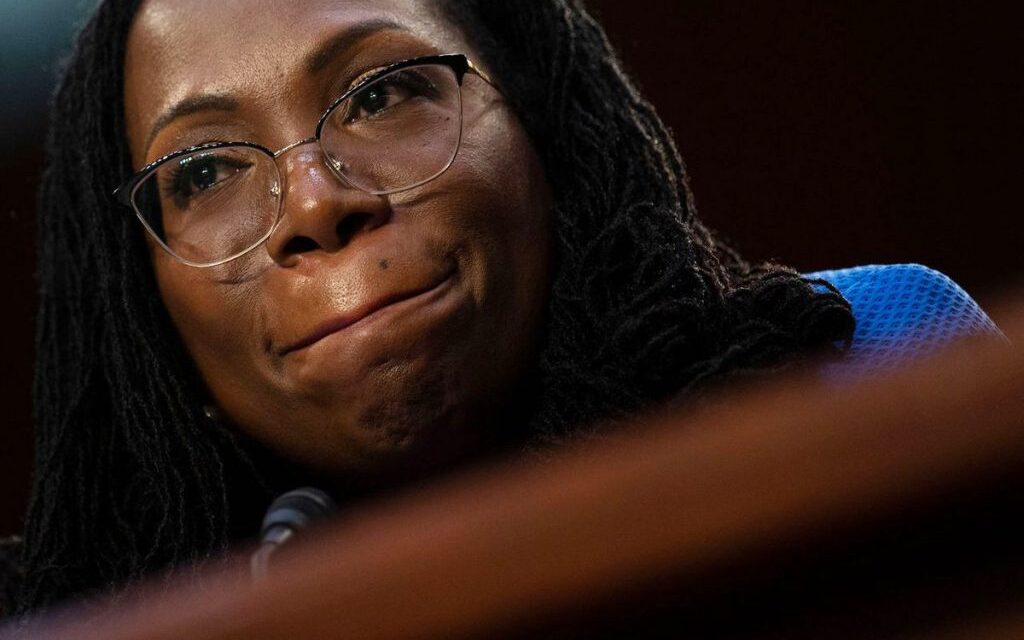No weapon.
That was all I could think, all I could muster. All I could pray.
All I could hold onto—as a Black man, as someone who strives to be a decent human—as I watched Judge Ketanji Brown Jackson endure 20 hours of questioning (at best) and demagoguery (at its hideous worst) during the U.S. Supreme Court confirmation hearings before the Senate Judiciary Committee.
It was all I had as I watched Republican Sen. Marsha Blackburn so twist Brown Jackson’s writings, so snatch them from context that fact-checkers just threw up their laptops in abject disgust.
As I watched Republican Sen. Lindsey Graham embody the p(athetic) in petty, ranting on about Guantanamo Bay, Afghans, a phantom “war” against his preference for the high-court nominee, a daring to question Brown Jackson’s faith—all things that have about as much to do with being a Supreme Court justice as butter.
As I watched Republican Sen. Ted Cruz, who grows more abhorrent each time he speaks. As I watched him stoop to infantile depths with each ignoramus wave towards a grade-schoolish show-and-tell placard on a children’s picture book that does not remotely say what he claimed it says—that babies “are racist”. As he then turned to the judge with an insidious, insultingly incomprehensible, just plain ignorant question:
“Do you agree with this book that is being taught with kids that babies are racist?”
I’m not naïve. I knew these hearings would be politically contentious. Ridiculously so, I even presumed. Presidents have submitted 164 Supreme Court nominations in our nation’s history, confirming 127—30 were dinged by Senate votes (even a George Washington nominee, John Rutledge, in 1775); seven, according to the Senate, decided they simply did not need the aggravation.
I’m seasoned enough to recall the origin of the term “Borked”, a unendearingly enduring reference to Ronald Reagan 1987 nominee, Robert Bork, who was torpedoed by an overwhelmingly Democratic Senate voice vote, 42-58. And I envision like it’s yesterday the historically contentious 1991 nomination of Clarence Thomas, who succeeded the iconic Thurgood Marshall, the first African American to serve on the court, after fending off ugly accusations of sexual harassment levied primarily by Anita Hill, who once reported to him at the U.S. Department of Education and the Equal employment Opportunity Commission.
And, certainly, I know where we are now—throwing cultural spit wads over matters that do not impact most Americans’ lives.
Yet as I watched the door to the Republican clown car open this week, as I watched each red-nosed jester emerge and honk, I felt sorry for us all. I hurt for us all.
I hurt most for the gifted, unquestionably qualified Black woman sitting at a table in the U.S. Senate Committee Hearing room. Sitting backed by her husband and two children. Backed by all of us who’ve been there. Not in that specific seat, of course. But been there.
Been there and stared at faces of arrogance and, yes, privilege.
Been there and beyond, facing not-at-all-veiled question crafted diminish and/or demean. Been there and, at times, responded with—loud silence. With an expression that said all that need not be voiced.
No weapon.
I wonder how some, how these—not all—Republicans go home and look at the women in their lives, particularly their daughters. How they explain to them why they attacked a woman today. A woman of unimpeachable credentials. A woman whose path to this place is paved with persistence.
And excellence.
Why they did so simply because, well, nothing she had anything to do with. Nothing she was accused of. Nothing.
Why it less-than-paled against what justices Sonja Sotomayor, Elena Kegan, or Amy Coney Barrett—who was duplicitously ramrodded onto the bench weeks before the 2020 election—endured during confirmation.
Why none of those women had to reach for a handkerchief and wipe a tear from her eye or sweat from her cheek—while simultaneously emoting the strength of generations of Black women.
Why they attacked this Black woman—something most likely only a learned, viable critical race theorist can explain.
Immediately after Cruz spoke, Judge Brown Jackson folded her hands comfortably on the table in front of her, heaved the deepest of sighs, and turned towards him.
“Senator.”
Then silence.
Her eyes glanced skyward. She blinked twice. She dampened her lips.
Ten seconds.
Ten seconds that screamed.
Ten seconds that screamed for so many Black women. For so many Black men. For so many of our marginalized. For so many among us who’ve been pelted with insidious, insultingly incomprehensible ignorance—and looked skyward.
So many who paused. Who may have even prayed?
Who decided—in a very few seconds—the weapon formed against them didn’t dignify a response?
Not one that came from their depths. From the pain of what was endured to get to that place. What was overcome. What was conquered.
In those 10 seconds, Jackson Brown’s own journey likely flashed before her, between those two blinks. She likely saw her childhood in Washington, D.C., and Miami, as the daughter of two historically Black college graduates; saw her years at Harvard, where she led protests against a student who hung a Confederate flag from his window, and where she graduated magna cum laude; her three clerkships, including one with U.S. Supreme Court Associate Justice Stephen Breyer, the man she will replace on the nation’s highest bench.
She, too, may have seen so many Black women who endured before her. Too many to enumerate here. Too many—from Harriet Tubman to Michelle Obama—who endured insidiously, insultingly incomprehensible ignorance. And looked skyward.
So many who still endure—for her to be in that place. To be at the precipice of judicial achievement and service. To be the first Black woman to serve on the U.S. Supreme Court.
No weapon would prosper, her mind surely reminded her. In those 10 seconds.
“I don’t believe any child,” she finally began, “should be made to feel as though they are racist, or taught they are not valued., or though they are less than, that they are victims, they are oppressors. I don’t believe in any of that…”
A slight smile brightened her face, a knowing smile. A no-weapons smile.
It was all she needed.











